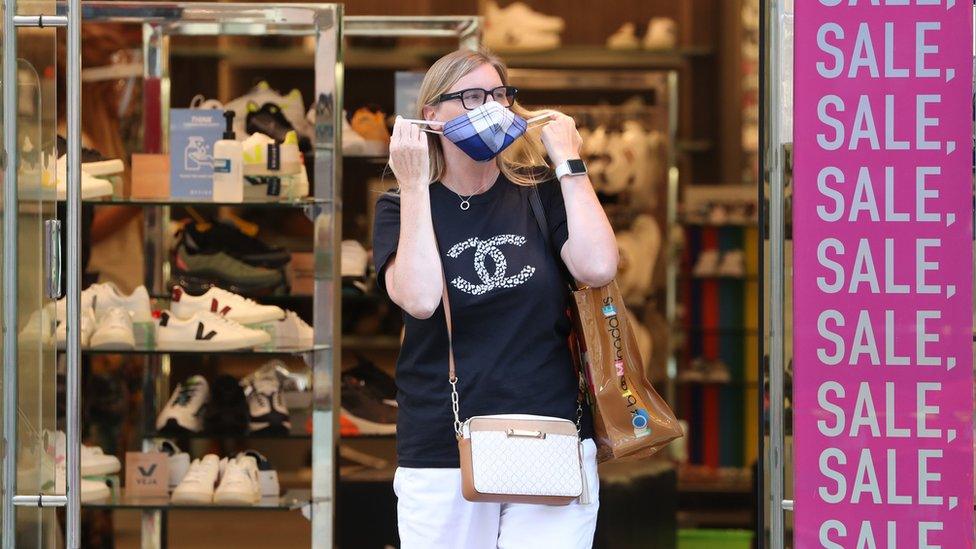Scotland officially in recession after GDP fall
- Published

Shops and bars were still not open in June
The Scottish economy slumped by almost a fifth between April and June, .
The figures show a drop in Gross Domestic Product (GDP) for the second quarter in a row, confirming the country's economy is in recession.
The coronavirus lockdown restrictions were introduced at the end of March, resulting in a 2.5% drop in economic performance in the first three months.
The estimated figure for April to June was a drop of 19.7% in GDP.
The latest economic data from the Scottish government provided provisional monthly figures that showed some improvement in June, with an increase of 5.7% compared with the previous month.
However, GDP "remains" 17.6% below the level in February, prior to the lockdown measures.
While the new GDP figures are provisional, the report says: "The unprecedented nature of this drop in output can be contrasted to the financial crisis and recession in 2008 and 2009, where GDP decreased by around 4% over the course of 18 months."
Figures released last week showed the UK economy suffered its biggest slump on record between April and June, shrinking 20.4% compared with the first three months of the year.
'Economic challenge'
First Minister Nicola Sturgeon told her daily briefing it was important to remember that while lockdown began to ease in June, many parts of the economy, especially retail and hospitality, remained closed.
Ms Sturgeon said: "The figures do present the scale of the economic challenge we face."
She said they underlined the case for continued Scottish and UK government action to support jobs and rebuild the economy.
The UK government's Scottish Secretary Alister Jack said the figures confirmed the significant impact of coronavirus on Scotland's economy.
He said: ""The UK government will continue to do everything possible, working with the Scottish government, to support people in Scotland through this difficult time."
Liz Cameron, chief executive of the Scottish Chambers of Commerce, said the country was now in "deep recession".
She said: "The collapse in Scotland's GDP in the second quarter sets alarm bells ringing even if the fall was expected."
Scottish Labour leader Richard Leonard said the "colossal drop" in GDP made clear that Scotland had one of the worst performing economies in Europe.
He called on the Scottish government to "step up to the plate" and produce a plan to kickstart Scotland's economy.
The Scottish Liberal Democrats said GDP was sluggish even before the virus struck.
Party leader Willie Rennie said: "It is important for the Scottish government to take new steps to promote prosperity. That should include reversing their decision to halt the expansion of childcare for a whole year."
The latest GDP figures showed the services sector - which makes up the largest part of Scotland's economy - was estimated to be up 4.3% in June, after growing 1.1% in May and falling 17.5% in April.
Construction output was estimated to have grown by more than a third (36.3%) in June, after an increase of 11.4% in May - however, performance in the sector did fall 49% in April.
Output for the construction sector remains 27.2% lower than it was in February, the report adds, although it said there is "particular uncertainty" about these figures "due to the absence of short-term regional data on output in the industry".
In the production sector, which includes manufacturing, output was estimated to have increased by 5.5% in June, after growing by 6.0% in May after a fall of 17.6% in April.